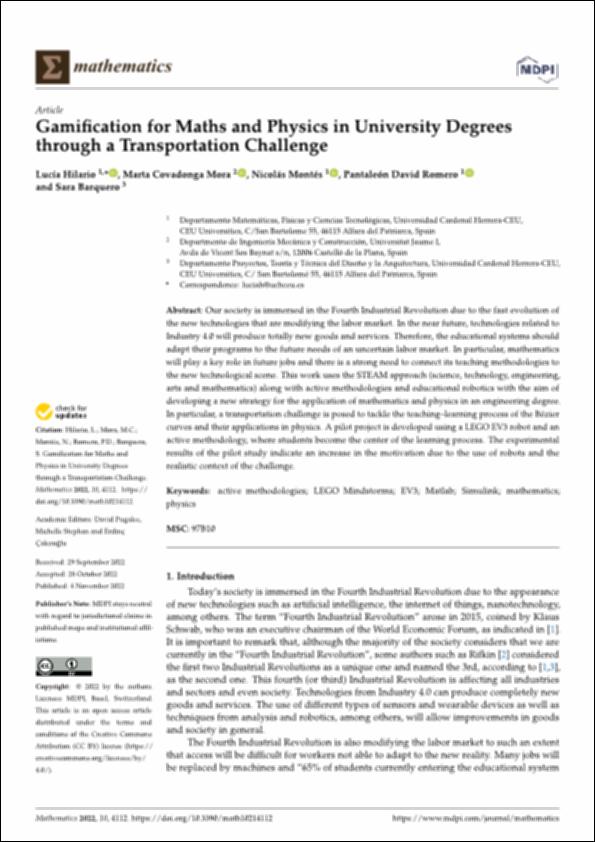Please use this identifier to cite or link to this item:
http://hdl.handle.net/10637/14320Gamification for maths and physics in university degrees through a transportation challenge
| Title: | Gamification for maths and physics in university degrees through a transportation challenge |
| Authors : | Hilario Pérez, Lucía Mora Aguilar, Marta Covadonga Montés Sánchez, Nicolás Romero Sánchez, Pantaleón David Barquero Pérez, Sara |
| Keywords: | Física - Didáctica - Enseñanza universitaria.; Physics - Study and teaching - Education (Higher); Matemáticas - Didáctica - Enseñanza universitaria.; Mathematics - Study and teaching - Education (Higher); Mathematics - Knowledge and learning - Education (Higher); Physics - Knowledge and learning - Education (Higher); Tecnología educativa - Enseñanza primaria.; Educación - Innovaciones tecnológicas - Enseñanza universitaria.; Física - Aprendizaje - Enseñanza universitaria.; Matemáticas - Aprendizaje - Enseñanza universitaria.; Educational technology - Education (Higher); Education - Technological innovations - Education (Higher) |
| Publisher: | MDPI |
| Citation: | Hilario, L., Mora, M. C., Montés, N., Romero, P. D. & Barquero, S. (2022). Gamification for maths and physics in university degrees through a transportation challenge. Mathematics, vol. 10, i. 21 (04 nov.), art. 4112. DOI: http://dx.doi.org/10.3390/math10214112 |
| Abstract: | Our society is immersed in the Fourth Industrial Revolution due to the fast evolution of the new technologies that are modifying the labor market. In the near future, technologies related to Industry 4.0 will produce totally new goods and services. Therefore, the educational systems should adapt their programs to the future needs of an uncertain labor market. In particular, mathematics will play a key role in future jobs and there is a strong need to connect its teaching methodologies to the new technological scene. This work uses the STEAM approach (science, technology, engineering, arts and mathematics) along with active methodologies and educational robotics with the aim of developing a new strategy for the application of mathematics and physics in an engineering degree. In particular, a transportation challenge is posed to tackle the teaching–learning process of the Bézier curves and their applications in physics. A pilot project is developed using a LEGO EV3 robot and an active methodology, where students become the center of the learning process. The experimental results of the pilot study indicate an increase in the motivation due to the use of robots and the realistic context of the challenge. |
| Description: | Este artículo se encuentra disponible en la siguiente URL: https://www.mdpi.com/2227-7390/10/21/4112 Este artículo de investigación pertenece al número especial "Mathematics as the M in STEM Education". |
| URI: | http://hdl.handle.net/10637/14320 |
| Rights : | http://creativecommons.org/licenses/by/4.0/deed.es |
| ISSN: | 2227-7390 (Electrónico) |
| Language: | es |
| Issue Date: | 4-Nov-2022 |
| Center : | Universidad Cardenal Herrera-CEU |
| Appears in Collections: | Dpto. Matemáticas, Física y Ciencias Tecnológicas |
Items in DSpace are protected by copyright, with all rights reserved, unless otherwise indicated.


